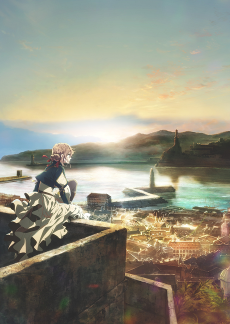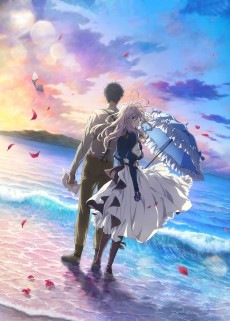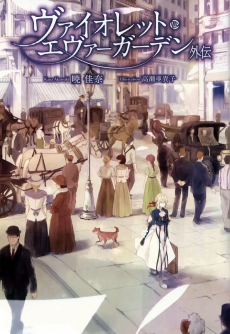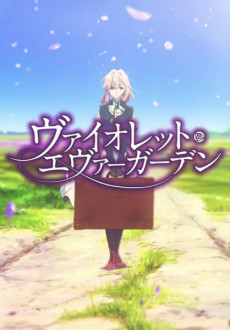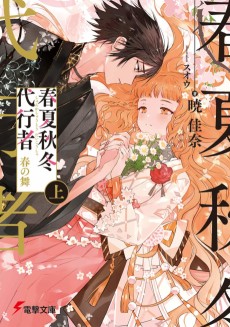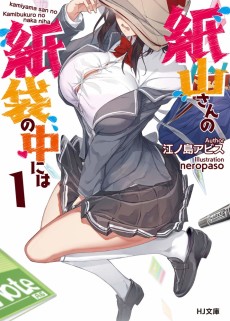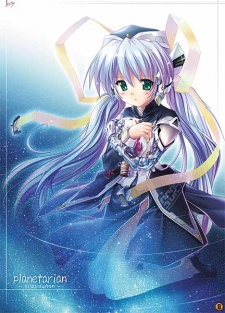VIOLET EVERGARDEN
STATUS
COMPLETE
VOLUMES
2
RELEASE
December 26, 2016
CHAPTERS
13
DESCRIPTION
Auto Memories Doll.
It's already been a long time since that name was first popularized. It's a machine that Dr. Orlando created that talks in a natural voice. At first, he only made it to help out his loving wife, but before long they spread out into the world. and companies were made to lend them out.
"I'm Violet Evergarden, the Auto Memories Doll who will rush to provide service anywhere you wish."
That translucent voice comes from a robotic beautiful girl with blonde hair and blue eyes like she came out of a storybook.
CAST
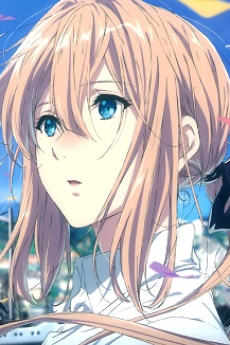
Violet Evergarden
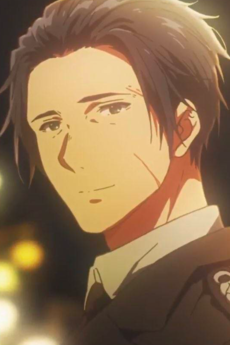
Gilbert Bougainvillea
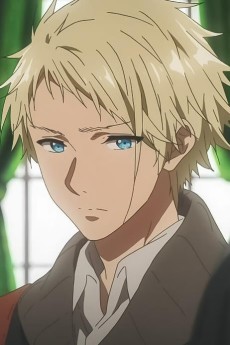
Benedict Blue
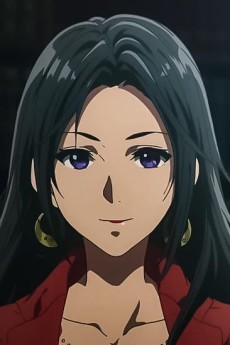
Cattleya Baudelaire
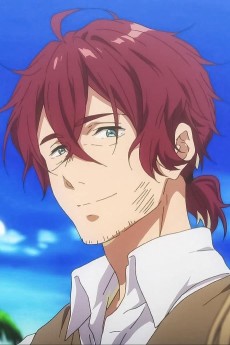
Claudia Hodgins
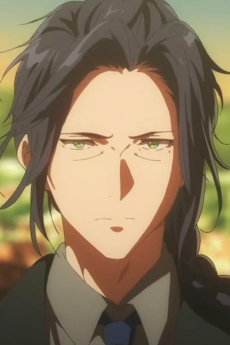
Dietfried Bougainvillea
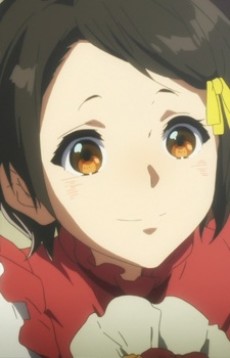
Ann Magnolia
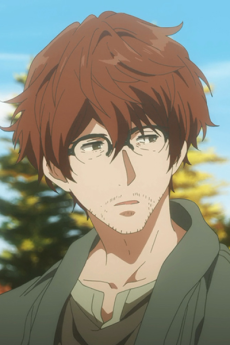
Oscar Webster
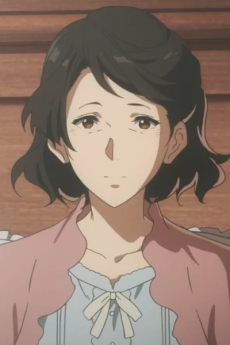
Clara Magnolia
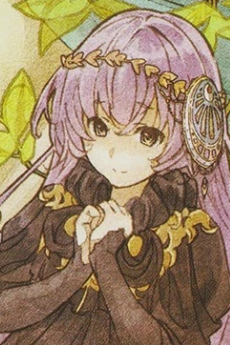
Lux Sibyl
CHAPTERS
RELATED TO VIOLET EVERGARDEN
REVIEWS

thePingusDingus
40/100"I do not mind however you treat me. I simply want to be with you." This novel is a tragedy masquerading as a romance.Continue on AniListPart 1: Anger and Confusion I love the Violet Evergarden anime. It is the only entry on my anime list that I have given a perfect score and I have seen it a total of four times in nine months. That sounds like a lot, and it is a lot, but it just happens to be a show that means a lot to me.
I’m confused, because this mess of a novel somehow managed to get adapted into a masterpiece of a show, and I’m angry because the anime adaptation set such a massive bar that I expected the novel to be an instant 100/100 as well, but it isn’t. It’s not amazing. Hell, in so many instances I’d hesitate to call it good, and the only reason I don’t outright call it “bad” is because it would hurt my Violet Evergarden fanboy soul.
Part 2: Strange Pacing and a Rough Character Arc A large majority of the chapters in Volume 1 focus on Violet’s clients and pays zero to no attention to Violet and her own arc. Then, suddenly, chapter 6 comes around THREE TIMES the length of the previous chapters’ average, and dumps Violet’s entire backstory on us. How she became a soldier, how Gilbert took her in, how he raised her, died, and told her “I love you”, sending her on her iconic mission of trying to learn what that means.
So, Violet’s story truly starts in the second volume, in which chapter 8 is what got adapted into the show’s first episode. Speaking of the show, it handles Violet’s arc masterfully. She is very early on established as emotionally inept and dependent on a person who most people believe to be dead. Throughout several episodes, she learns how to interpret other people’s hidden emotions and put them on paper even in ways they themselves couldn’t.
Contrast this to the novel. She visits five clients in volume 1 and performs her duties as if she were a professional. We never got to see her grow to the point where she was in volume 1, she just seems like a very deep person, one that comes off as a bit cold and distant, but nevertheless, one that already overcame the most trialing struggles in her life.
Now, what exactly is Violet’s arc? She started out as a violent, lethal child that killed several of Dietfried’s men after they attempted to rape her. She was a skilled soldier, and when the major died, he told her to “live and be free”. The anime tackles this by Violet being haunted by her military past and almost suffering a breakdown when Dietfriend wants her to kill again. What does she do in the novel? She punt-kicks nuns out of windows and throws a man off a moving train. In other words, she remains a soldier that has practically zero qualms with doing what would most likely violently kill the people involved, aka she barely changed.
Part 3: A Worse Major, a Worse Love Story Major Gilbert, in the anime, is a deeply flawed individual who gets a redemption arc in the movie. I don’t think his redemption arc was handled as well as it could’ve been, but that’s a topic for a different review. How is he different in the novel?
For one, he’s worse.
In the anime, recruiting Violet was a direct order from his superior officers. In the novel, he sees Violet on the training grounds and decides himself he needs her in the army. He then literally has to convince the officers to let her in, and they are pretty hostile to the idea. So, instead of a regretful commander, he is a man who actively puts in the effort to recruit a child soldier.
As for his relationship with Violet, it is important to first note that in chapter 6, it is said that he sees her like a daughter, but that only makes the romance worse (father/daughter dynamic -> lovers is, in my opinion, an extremely uncomfortable trope). Not to mention that after he abandons her, he has no time to fall in love with her. The next time they meet she is 13/14 and he kisses her. They had no time to develop their love story, it just happened. So, if there was any doubt that the anime Gilbert was a pedophile, there is none here.
But by far, the worst aspect of him is how his “redemption” arc is handled. In the final chapter, after he’s come to terms with all the horrible things he did - namely, forcing nine years old Violet into war, he goes to her to say sorry. Violet’s response to his apology is this:
“Please, stay by my side… I do not mind however you treat me. I simply want to be with you. That is all. Nothing else… is necessary. Major, I…”
She doesn’t accept his apology, because she doesn’t recognize that he ever did anything wrong. Instead of becoming an independent woman who chooses to stay with Gilbert, she instead says “You did nothing wrong, I don’t mind anything that you do to me, I need you”.
What a bleak ending for a teenage girl. The fact that the novel continuously refers to Gilbert as “Violet’s Lord” certainly doesn’t help.
Part 4: What the Hell Is Up With Edward Jones and Lux Sibyl? These are two extremely weird characters that I am fully glad weren’t adapted into the anime.
First of all, Edward Jones. He is introduced as a war criminal in police custody. And by a war criminal, the novel really does imply some Josef Mengele-type shit. We’re talking maiming, torture, ritualistic sacrifice of his own men, and building towers of civilian corpses. Once he hires Violet, he spends a lot of time comparing himself to her, really giving her a “We’re not so different, you and I” moment.
This is untrue.
It doesn’t need to be said that Violet is nowhere near as bad as Jones is, but the novel really pushes that Jones is someone who has just as much of a heart as Violet does, as if he wasn’t established to be a purely evil character. Later, he escapes custody and tells Cattleya “Say hi to Violet for me”. His inclusion accomplished nothing, and by the end of his “arc”, he is a brutal war criminal at large. His inclusion raised more questions than anything and was an entirely negative mark on the novel’s score.
Next up, Lux Sibyl. She is worshiped as a demigod by some nuns on a secluded island, though she is actually just a normal teenage girl that the nuns plan to murder in a ritual (notice how this is totally jarring with the theme of Violet Evergarden as a whole). She feels trapped on that island, which Violet helps her realize, and then helps her flee the island. Lux is then treated as “Violet’s first friend” though their friendship wasn’t explored in the slightest - Violet was friends with her just as much as she was with Cattleya. I have not read Violet Evergarden Gaiden as of writing this review, but I assume that Amy Bartlett serves the role of Violet’s first friend much better than Lux did.
Part 5: There Is Actually Some Good Stuff Here Violet Evergarden is an anime that means a lot to me, so I don’t want to end my review of its source material on a negative note.
Some of the episodic chapters of this novel are, put simply, stellar. The playwright chapter isn’t the strongest opener, but chapter two is about a daughter about to lose her mom - the one adapted by episode 10, and it truly shows that Kana Akatsuki is a skilled author. It explores themes of existentialism and nihilism, and a young child attempting to grasp why all these awful things are happening to her (her father abandoning her and her mother dying).
Chapter 3, the one adapted by episode 11, about soldier Aidan Field, is actually better than the adaptation. Not only does it show how war sends young men to needlessly die, but it is also a critique of imperialism, as Aidan was sent to a foreign country to die for oil. The chapter stresses how Aidan, and many like him, simply don’t have any reason to hate the men they were taught to perceive as enemies.
Chapter 9 is probably my favorite, and it is a genuine disappointment that it wasn’t adapted. It is about a man with a demented mother, about to get married. It’s what is supposed to be the happiest day of his life, and his mother doesn’t even remember who he is. The wedding goes through, and his mother does seem to remember who he is, ever so briefly. Violet isn’t there to write a letter, she stayed in their village because she was stranded there with Benedict, but she stays to learn more about a parent’s love and it’s really beautiful.
Part 6: A Very Unenthusiastic Conclusion Unfortunately, all that praise of the episodic chapters can’t retcon the fact that the character development of the titular protagonist is minimal and the novel’s message about being reliant on an abusive love interest is genuinely dangerous. The chapters mentioned in the previous part do however prove that Kana Akatsuki is a talented writer (this wouldn’t get adapted into such an amazing show if that wasn’t the case), but that makes the novel’s low quality sting that much more.
Goodbye, Violet Evergarden. You were the most disappointing thing I’ve read so far.
SIMILAR MANGAS YOU MAY LIKE
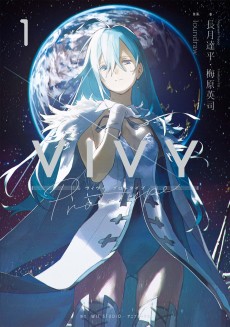 NOVEL Sci-FiVivy prototype
NOVEL Sci-FiVivy prototype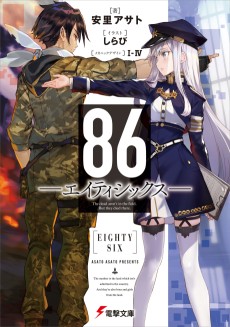 NOVEL Action86: Eighty Six
NOVEL Action86: Eighty Six
SCORE
- (4.15/5)
MORE INFO
Ended inDecember 26, 2016
Favorited by 327 Users


